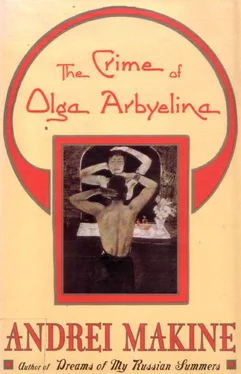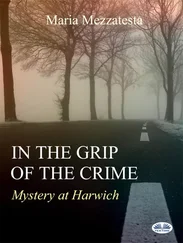• • •
After a moment Olga sensed that Li was listening to her with slight apprehension-the fear of someone who already foresees a confession that may well catch them off guard, invest the friend's familiar face with unknown, disturbing features. And even undermine an old friendship. At intervals she began adding her own comments to the story with a vigor and a passion that each time struck a wrong note. She waxed indignant about the torture that used to be inflicted on pupils straightened out with the plank; mocked the couple surprised in an armchair… And when Olga talked about the depraved life in the capital of her youth, Li had begun to murmur, as if apologizing,"Oh, but you see, I never really saw much of that life. In the trenches what we saw mostly was death…"
From the kitchen came the whistle of the kettle. Their tentative conversation broke off. Left alone for a few minutes, Olga felt relieved. She had lost hope of any miracle of understanding… And yet she seemed to sense that Li, also alone for a moment, was timidly preparing the way for an unutterable confession of her own. And when she came in carrying two cups and an old teapot with a chipped spout on a tray, when she set about arranging the tray and pouring the tea with an exaggeratedly concerned air, and fussing unnecessarily about each little detail ("Wait, I'll get you another spoon…"), Olga understood that behind these words a serious statement, hard to articulate, was already forming.
"You know what I was saying just now about the trenches and soldiers," said Li, while her hands continued to hover around the tray. "Well, I lived among them for three years. So I know what I'm talking about. They were mostly young. And I noticed that some of them-but they were very rare-died without believing in death. And at the moment when they died we didn't believe in it either, at least not right away…"
Her voice faded and, almost in a whisper, turning her eyes away, she breathed, "But for you, it's not the same. There's a child. Your child… I'm sorry, I'm being stupid…"
And not knowing how to break the spell of silence brought on by her words, she disappeared into the next room and returned with a bundle of newspapers in her arms.
"You'll say that I'm not being objective," she announced in an almost cheerful tone, wanting to make a fresh start after the previous sentence. "But, you see, in the field of science and… medicine" (her voice slid once more toward a fear of being hurtful) "the Russians, well, the Soviets, are very advanced. Listen to what I read yesterday, and it wasn't in Pravda but in Le Figaro: 'A Russian scientist, Professor A. A. Isotor, has made the sensational discovery that the radius of the earth measures eight hundred meters more than was previously believed and that the earth itself is apparently not spherical but elliptical…' I just thought that perhaps with your son, you could…, well, take him there, if only for an examination…, for a week or two…"
Olga could not help smiling. And to avoid passing over this suggestion yet again in silence she asked, "So when do you think you'll be leaving?"
"I think everything will be ready by the end of April. The last snows will have melted in Russia and I'll be able to go there by road…"
"The last snows… in Russia…" These words sank into Olga's memory and resurfaced occasionally during the return journey. Each time the echo of them brought with it a brief moment of daydreaming. Then the hardness of dry and final words shattered its snowy aura. Final was the certainty of never being able to tell even her closest friend what had happened to her. The very worst thing that Li could imagine was the deterioration of the child's illness. But that! No, for a person with a healthy mind it was inconceivable… As it was for all these passengers sitting around her in the train. She felt a transparent wall rising up between her and them, a glass dome transforming her, with her desperate desire to confide, into a fish in an aquarium. For an instant it seemed to her that even if she had uttered a long wail of misery none of her neighbors would have turned their heads.
"The last snows… in Russia." She tried to hold on to the sound of the words in her mind, to make it last. And to say (to Li, or to someone else) what was out of bounds to words. "You see, I talked to you about my youth to justify myself. Everything was disintegrating, going off the rails, and our lives were a reflection of those sick early years of the century. We strove to resemble them. And so instead of living we played at leading unnatural, capricious lives. We were under the impression that alongside us, the normal life that we despised, because it was too rectilinear, continued in parallel and that we could always come back to it when we had had enough of our games. But one day I saw that my two lives had grown too far apart and that I must now follow to the end the one I had chosen for fun, in the defiance of youth. And I have lived this ill-chosen life, with my eyes fixed on the other one. And what is happening to me today- you've guessed, haven't you, without my explaining it to you, you've guessed everything and you haven't turned away from me-Yes, everything in the life I am leading now that is monstrous, criminal, odious, is in the very nature of this unnatural life… Tell me very simply what I must do. Tell me my face gives nothing away, nor the expression in my eyes, nor my voice. Do you think one day I may be able to look at those trees, those rails, that sky the way I did before?"
It was dark when she reached Villiers-la-Forêt. As she was removing her shoes in the hall she noticed that the pair of men's shoes had moved. "He must have tried them on again, looking forward to wearing them in the spring…" She pictured this very young man, slim, with dark hair, a pair of well polished shoes on his feet, preening himself in front of the mirror in her absence…
"All this is what madness must look like," she told herself, and went into her bedroom.
Two weeks later, one December evening, everything was repeated with infallible, fanatical precision: the hint of white powder on the surface of the infusion; the slightly mechanical stiffness of her hand as it poured away the liquid and washed the little copper saucepan. And in her bedroom, the familiar clock face reflected in the mirror, telling the time backward…
A slight tremor almost betrayed her. The response of her flesh- neck, shoulder, breast-to the burning touch of the icy fingers lightly stroking it had been too violent. She felt no connection with this female body. And in the purple void beyond her eyelids there stretched an unknown body. A body with the scent of hoarfrost brought in among the folds of a man's long overcoat… Her brief tremor and a repressed "Oh!" had risked revealing that she was not asleep. The fingers paused in their caress, then came to life again. She became yet more absent. Under the touch of the fingers that were slowly growing warmer, she discovered the delicacy of her collarbone and the dense weight of her breast as it held the caress. She lay on one side, her face half buried in the pillow. An ideal pose, she thought, for her pretense of sleeping, and one that allowed her not to be a part of what was happening to this woman's body as it was caressed. But suddenly the fingers pressed more firmly on her shoulder, then her hip, as if to turn her over. She felt feverishly present in this body once more; imprisoned in it. And, once placed on her back, she was too exposed, could no longer lie…
The fingers squeezing her shoulder relaxed their grip. A dry creak could be heard at the other end of the room. Without opening her eyes she recognized the sound. A burning log, as it collapsed, had pushed against the door of the stove. Between her eyelashes she made out the image in the mirror. A naked youth, crouching beside the stove, was gathering up small sticks, burnt out or still glowing, and tossing them into the embers…
Читать дальше












